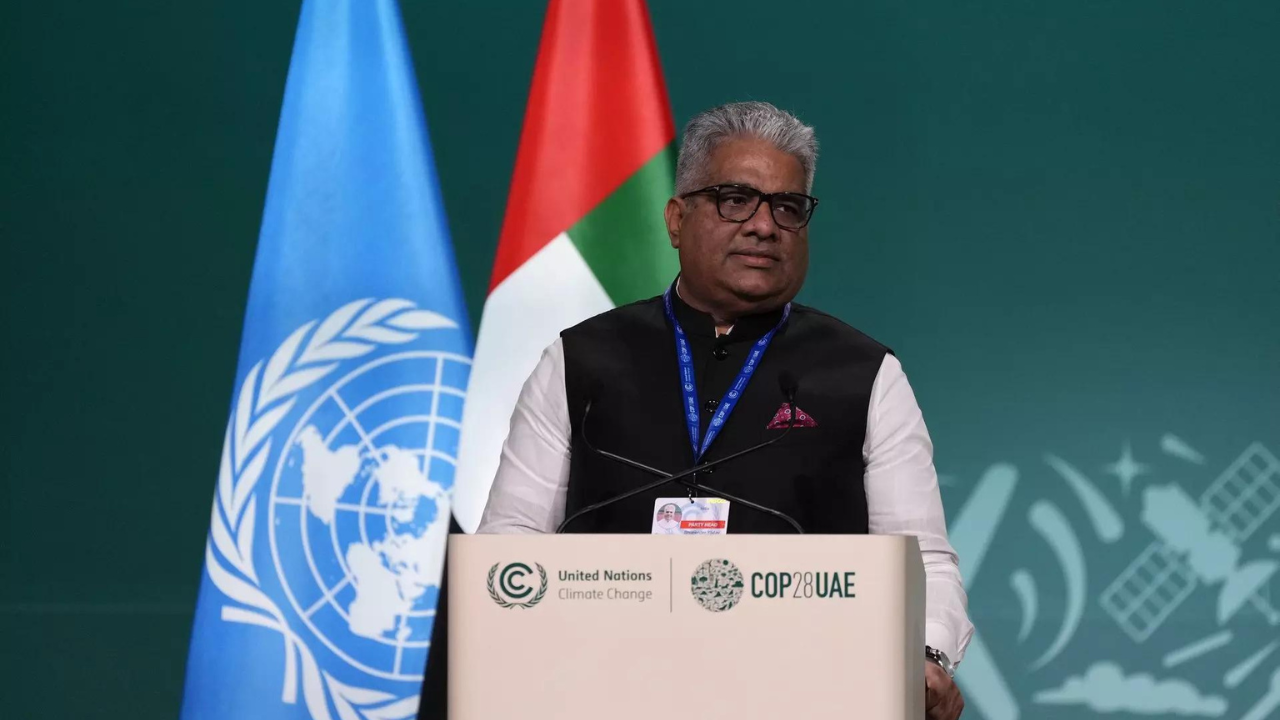NEW DELHI: India did not accede to the pressure from developed countries on the issue of fossil fuels at recently concluded UN climate conference (COP28) in Dubai and the country would continue to use coal until it achieves its developmental needs, said environment minister Bhupender Yadav on Tuesday.
“While we are increasing our renewable energy capacity, we will also have to rely on coal power until we achieve the objective of a developed India,” said Yadav while underlining that the country cannot meet the energy needs of its people by just “importing oil and gas”.
Yadav, who led the Indian team of negotiators at COP28, was addressing a press conference where he emphasised that the country has gained a global stature under Prime Minister Narendra Modi’s leadership and the world recognises its leadership in climate action, innovation and technology.
Noting that the IMF, World Bank and several global heads have acknowledged India as the bright spot amid an otherwise global downturn, Yadav who is also labour & employment minister said the country is set to overtake Germany in terms of GDP in 2025 and Japan in 2027 to become the third-largest economy after the US and China.
Yadav later launched a report on ‘A Green and Sustainable Growth Agenda for the Global Economy’ in the presence of G20 Sherpa Amitabh Kant and Niti Aayog vice chairman Suman Bery at a different event.
“Through its G20 Presidency steered by the Prime Minister, India had put forth the resolve to make climate action a collaborative process based on common but differentiated responsibilities and respective capabilities (CBDR-RC). India’s voice was not only heard, but also significantly included in the UAE (COP28) declaration,” said the minister.
Referring to one of key outcomes of COP28, he said, “The operationalisation of the Loss and Damage Fund is an example of India’s success in emerging as an impactful voice of the Global South.”
The report, launched by Yadav, has been prepared by Niti Aayog. It’s a summary of the key discussions from the policy conference, organised as a G20 side event on July 28-29, that focused on green and sustainable growth.
Some of the key ideas and thoughts shared by the experts during the two-day deliberations in July were also incorporated in the G20 New Delhi Leaders’ Declaration in September. The report is expected to provide valuable inputs for Brazil, which took over the G20 presidency on December 1, and the other upcoming G20 presidencies.
“While we are increasing our renewable energy capacity, we will also have to rely on coal power until we achieve the objective of a developed India,” said Yadav while underlining that the country cannot meet the energy needs of its people by just “importing oil and gas”.
Yadav, who led the Indian team of negotiators at COP28, was addressing a press conference where he emphasised that the country has gained a global stature under Prime Minister Narendra Modi’s leadership and the world recognises its leadership in climate action, innovation and technology.
Noting that the IMF, World Bank and several global heads have acknowledged India as the bright spot amid an otherwise global downturn, Yadav who is also labour & employment minister said the country is set to overtake Germany in terms of GDP in 2025 and Japan in 2027 to become the third-largest economy after the US and China.
Yadav later launched a report on ‘A Green and Sustainable Growth Agenda for the Global Economy’ in the presence of G20 Sherpa Amitabh Kant and Niti Aayog vice chairman Suman Bery at a different event.
“Through its G20 Presidency steered by the Prime Minister, India had put forth the resolve to make climate action a collaborative process based on common but differentiated responsibilities and respective capabilities (CBDR-RC). India’s voice was not only heard, but also significantly included in the UAE (COP28) declaration,” said the minister.
Referring to one of key outcomes of COP28, he said, “The operationalisation of the Loss and Damage Fund is an example of India’s success in emerging as an impactful voice of the Global South.”
The report, launched by Yadav, has been prepared by Niti Aayog. It’s a summary of the key discussions from the policy conference, organised as a G20 side event on July 28-29, that focused on green and sustainable growth.
Some of the key ideas and thoughts shared by the experts during the two-day deliberations in July were also incorporated in the G20 New Delhi Leaders’ Declaration in September. The report is expected to provide valuable inputs for Brazil, which took over the G20 presidency on December 1, and the other upcoming G20 presidencies.
Denial of responsibility! Swift Telecast is an automatic aggregator of the all world’s media. In each content, the hyperlink to the primary source is specified. All trademarks belong to their rightful owners, all materials to their authors. If you are the owner of the content and do not want us to publish your materials, please contact us by email – swifttelecast.com. The content will be deleted within 24 hours.


